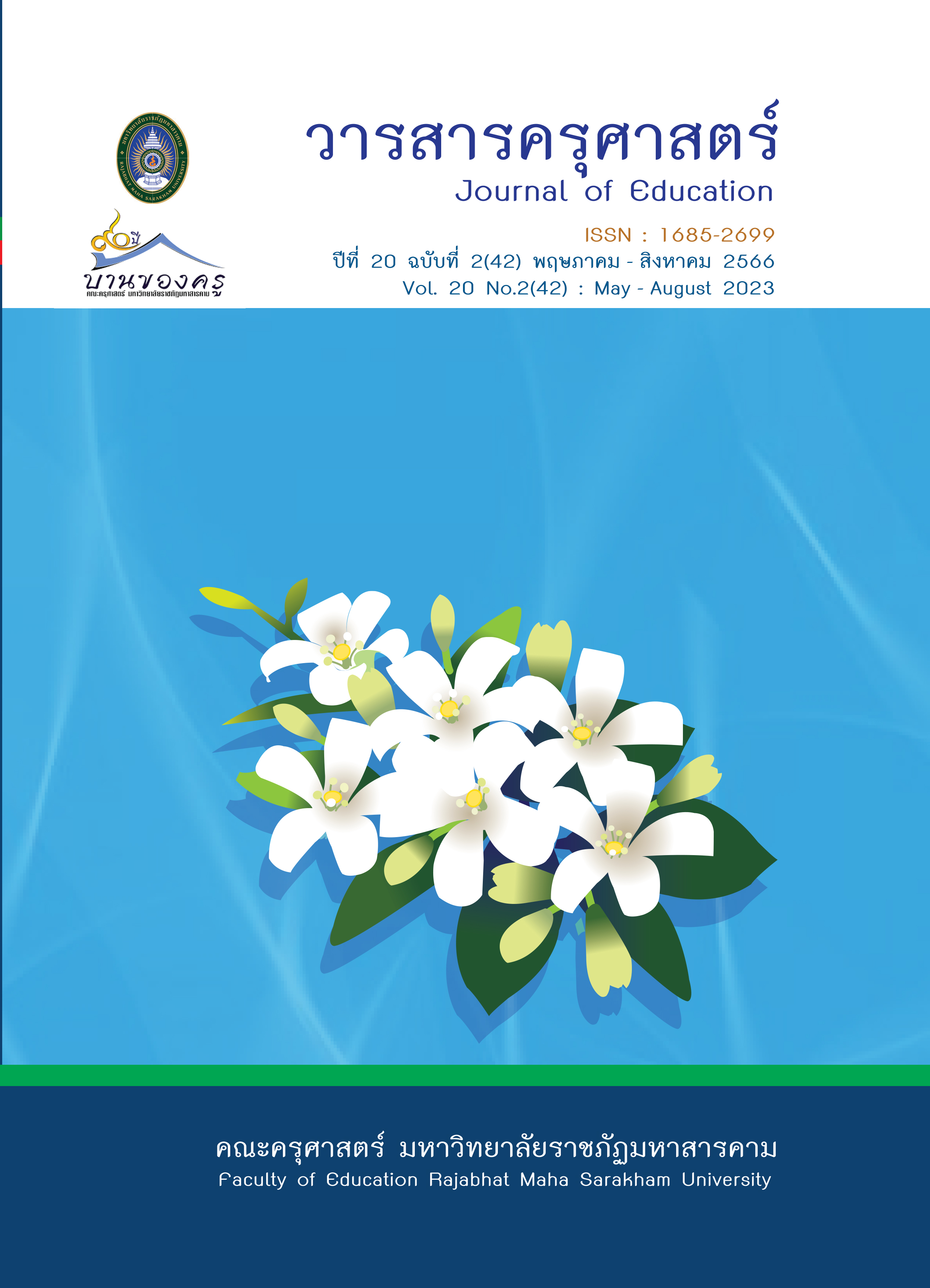A Curriculum Evaluation on Bachelor of Education Program in Educational Technology and Computer (Revised Curriculum 2019) Vongchavalitkul University
Main Article Content
Abstract
The purposes of the research were to 1) evaluate the Bachelor of Education Program in Educational Technology and Computer (Revised Curriculum 2019) and 2) study guidelines for the development of Education Program in Educational Technology and Computer programs, Vongchavalitkul University with compatibility of the 4 CIPP indicators. The key informants were 6 instructors in charge of the program, 15 course instructors, 22 students of Bachelor of Education Program in Educational Technology and Computer in the academic year 2020 and 2021 and 20 employers, totaling 63 people. The research tools included: 1) structured interview and 2) questionnaire. The data analysis statistics were frequency, percentage, mean and standard deviation.
The research results were as follows: 1) Context: the overall curriculum context assessment was at a high level. 2) Input: the structure and content found the instructors in charge of the program, program instructors and instructors from other departments indicated that the curriculum is appropriate in terms of structure and content at a high level. 3) Process: the teaching and learning management found the instructors in charge of the program, program instructors, instructors from other departments and current students opined that the curriculum is appropriate in terms teaching and learning process at a high level. 4) Productivity: the characteristics of the graduates found the employers, instructors in charge of the program, program instructors, instructors from other departments and current students agreed that the characteristics of the graduates are appropriate at a high level.
Article Details

This work is licensed under a Creative Commons Attribution-NonCommercial-NoDerivatives 4.0 International License.
ข้อกำหนดเบื้องต้นที่ผู้นิพนธ์(ผู้ส่งบทความ) ควรทราบ
1. ผู้นิพนธ์ที่ประสงค์จะลงตีพิมพ์บทความกับวารสาร ตั้งแต่เดือนมกราคม 2563 เป็นต้นไป ให้ใช้รูปแบบใหม่ (Template 2563) โดยสามารถดูตัวอย่างได้ที่เมนู GUIDELINES
2. จะตีพิมพ์และเผยแพร่ได้ ต้องผ่านการประเมินจากผู้ทรงคุณวุฒิ (Peer Review)
3. การประเมินบทความโดยผู้ทรงคุณวุฒิ (Peer Review) เป็นแบบ Double Blind
4. การอ้างอิงบทความใช้หลักเกณฑ์ APA (American Psychological Association) คลิก
5. บทความถูกปฏิเสธการตีพิมพ์ ไม่ผ่านการประเมิน ผู้นิพนธ์ขอยกเลิกเองหรือชำระเงินก่อนได้รับการอนุมัติ ทางวารสารไม่มีนโยบายการคืนเงิน
References
ชญากาณฑ์ ขันธ์แก้ว. (2560). การประเมินหลักสูตรการจัดการเรียนการสอนตามหลักสูตรกระทรวงศึกษาธิการเป็นภาษาอังกฤษ โรงเรียนสาธิตมหาวิทยาลัยราชภัฏราชนครินทร์ [วิทยานิพนธ์ปริญญามหาบัณฑิต]. มหาวิทยาลัยราชภัฏราชนครินทร์.
ณัฐวัชร จันทโรธรณ์ และไพโรจน์ ญัตติอัครวงศ์. (2565). การพัฒนาหลักสูตรและการเรียนการสอน. วารสารมหาจุฬาวิชาการ, 9(1), 336-347
ธนภัทร มีนา, สุนทรา โตบัว และวรัทยา ธรรมกิตติภพ. (2561). การประเมินหลักสูตรศึกษาศาสตรบัณฑิต สาขาวิชาเทคโนโลยีและสื่อสารการศึกษา (ฉบับปรับปรุง พ.ศ. 2555) มหาวิทยาลัยเทคโนโลยีราชมงคลธัญบุรี. วารสารวิชาการมหาวิทยาลัยธนบุรี, 12(27), 24-36.
ประดิษฐ์ ศรีโนนยาง, บรรจบ โชติชัย, กิตติพัฒน์ ทาวงศ์ษา, พลภัทร อภัยโส และยชุรเวท หงส์สิริ. (2561). การประเมินหลักสูตรศึกษาศาสตรบัณฑิต สาขาวิชาการสอนภาษาอังกฤษ (5 ปี) (หลักสูตรปรับปรุง พ.ศ. 2556) คณะศึกษาศาสตร์. มหาวิทยาลัยมหามกุฏราชวิทยาลัย วิทยาเขตศรีล้านช้าง. Journal of modern learning development, 5(5), 182-196
ปิยะธิดา ปัญญา. (2562). การประเมินหลักสูตรปรัชญาดุษฎีบัณฑิต สาขาวิจัยและประเมินผลการศึกษา มหาวิทยาลัยราชภัฏมหาสารคาม. (รายงานการวิจัย). มหาวิทยาลัยราชภัฏมหาสารคาม.
มารุต พัฒผล. (2562). แนวคิดหลักการพัฒนาหลักสูตร. ศูนย์ผู้นำนวัตกรรมหลักสูตรและการเรียนรู้ มหาวิทยาลัยศรีนครินทรวิโรฒ.
รัตนะ บัวสนธ์. (2562). วิจัยและพัฒนาหลักสูตรและการเรียนการสอน. วารสารศิลปากรศึกษาศาสตร์วิจัย. 11(2), 1-11.
สำนักงานคณะกรรมการการอุดมศึกษา. (2565). เกณฑ์มาตรฐานหลักสูตรระดับอุดมศึกษา พ.ศ. 2558. บริษัทวงศ์สว่างพับบลิชชิ่ง แอนด์ พริ้นติ้ง จำกัด.
Beauchamp, G.A. (1968). The Curriculum of the Elementary School. Allyn and Bacon, Inc.
Drost, E. (2011). Validity and Reliability in Social Science Research. Education Research and Perpectives. 38(1), 105-123.
Stufflebeam, D.L.,& et al. (1971). Educational Evaluation and Decision–Making. Itasca, Illinois : Peacock.
Taro Yamane. (1973). Statistics: an introductory analysis. Harper& Row.


